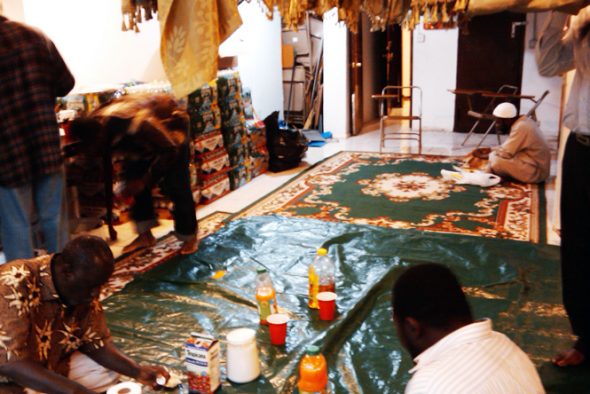In Brooklyn, go east on Ralph Ave and you’ll see two mosques. The Bangladeshi masjid.
http://bassamtariq.com/30days/Taw/brownmasjid.jpg
And then, two blocks later, the West African one.
http://bassamtariq.com/30days/Taw/street.jpg
http://bassamtariq.com/30days/Taw/masjidsign.jpg
My good friend Ibrahim AbdulMatin pressed me hard this afternoon to go to the West African masjid. To be honest, it was difficult passing up the South Asian mosque. I was Aman-less today and wasn’t ready to be out of my element. But I had to pop this brown bubble I’ve surrounded myself in and there was no better way to do it than pray and eat at Masjid Tawhid.
The musala was fairly small. A small line for wudu trailed into the prayer area.
http://bassamtariq.com/30days/Taw/musala.jpg
The stand out piece in the prayer area was the mambar, which took quiet a bit of space.
http://bassamtariq.com/30days/Taw/mambar.jpg
Like most of the masajid we’ve visited, there was a basement in where we all broke our fast. The adjacent room accommadated women. I’m not sure if any women were in attendance.
http://bassamtariq.com/30days/Taw/dates.jpg
During iftaar we had dates and a sweet oatmeal dish. All ten of the congregants watched me eat the soup and asked how it was. The soup was nice but very heavy.
http://bassamtariq.com/30days/Taw/soup.jpg
I didn’t want to disrespect the man who served me, so I tried my best to eat as much as I could. When the adhaan was called I quietly put the soup to the side and went back to the prayer room.
Dinner was kuskus with grounded meat. It was a Malian dish called “Hutto”. The meat was mixed with spinach and peanuts. Many of the congregants poured milk into the plate and offered me to try some. I didn’t have space in my stomach so I kindly rejected their offer.
http://bassamtariq.com/30days/Taw/kuskus.jpg
During the dinner, a brother sitting on a chair poked me and whispered.
“If you need anything, tell me and I’ll tell them.”
The brother looked like he was in his early 20’s and seemed like a serious person. I thanked him for the generosity and said I was fine. He went back to eating his hutto. When he was done, he threw his plate in the trash and left without saying a word to anyone. Even though he was black, there was a visible disconnect between him and the rest of the congregants. Most of the people were speaking Bambara and were from Mali. The brother looked as if he was born and raised in Brooklyn. (Note: I assume this because there is a certain swagger that the Muslims in Brooklyn have, ask the Brooklyn Bedouin if you don’t believe me.)
Things didn’t seem that awkward in the beginning. In fact, it was only when I started to wonder how the rest of the congregation percieved me that I began to feel uneasy. I felt like a freeloader coming in — barely eating the food offered to me — and then leaving abruptly aftewards . A bad exhibitionist, if you will. Though no one in the masjid might have felt that way, I wonder if anyone asked themselves, “Why didn’t he just go to the Bangladeshi mosque?” Maybe it’s my own insecurities that raise the question.

As I left the mosque, I saw these two South Asian kids unwrapping their new toy helicopters. I looked around and realized they were the closest Desis to Masjid Tawhid and prayed that they would only move closer.